Challenges and triumphs: Syrian refugees' 1st year in Canada
Even with war, turmoil and displacement behind them, life for Syrians in Canada hasn't been easy
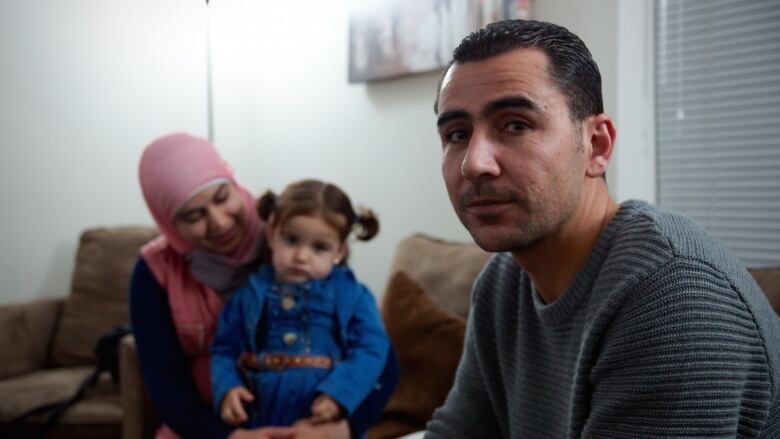
Shadi al-Radi works through some English lessons on YouTube. He diligently follows along with the instructor, taking notes and writing out phrases on his note pad. He says he's moved past the "English for Arabs" videos and on to basic English instruction.
Al-Radi, 29, was part of the first wave of Syrian refugees to arrive in Canada after the election of theLiberal government last fall.
- Syrian refugees fear what lies ahead as government-sponsored year runs out
- 'It was very hard': Learning English a struggle for Syrian refugees, and support not always there
When hearrived, he had no English, no job, no home for his young wife and babyand no plan.
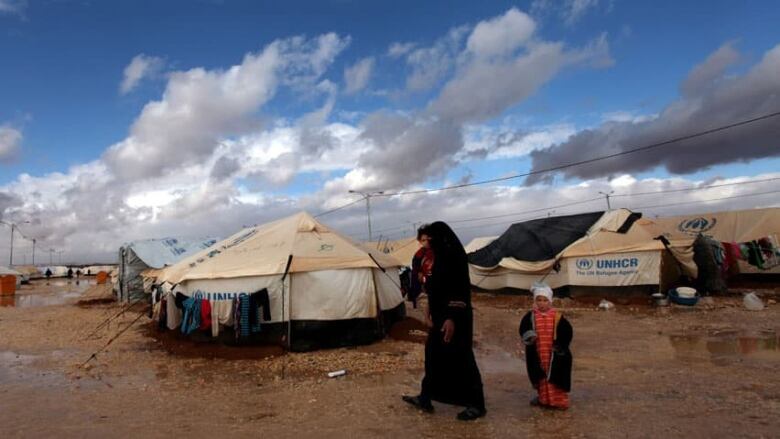
Before coming to Canada,al-Radispent three years in Jordan, someof it at theZaatarirefugee camp.
"Life was very, very difficult. Three years, I can't do anything," he said.
Moving to Canada
Al-Radisays he'dbarely heard of this country, and certainly hadn't considered moving here, when he suddenly got a phone call.
"I get a strange number on my cell phone," he said."Somebody on phone speaks Arabic, 'Are you Mr. Shadi al-Radi?' I say 'yeah.' He says directly, very fast, 'Are you interested to move to Canada?'"
Al-Radiwas told he would have 15 days to prepare to move, but he had to say yes or no immediately, without consulting his wife orany of his family members in Jordan.
Theywarned him how far away Canada was and how cold it got, but his main concern was leaving his ailing mother behind.
His wife, Saja Ayyash, 21, says she was afraid, "Because I don't know anything about Canada."

Still, the decision was made.
"I told [al-Radi]if he would like to go to Canada, I am with him. If he would like to stay in Jordan, I am with him."
Refugee surge
When the familyfinally made it to Vancouver, they spent their first three weeks at the Sandman Hotel on Davie Street.
Chris Friesen, director of settlement services for the Immigrant Services Society of B.C., said with the high numbers of refugee arrivals around thattime, that wasactually a relatively short hotel stay.
"Finding suitable, permanent accommodation throughout Metro Vancouver and Fraser Valley posed challenges," he said.
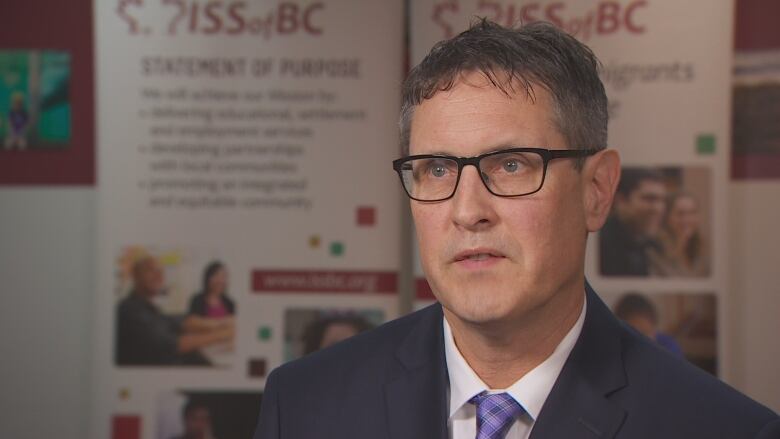
"In the case of the Syrian operation ...in some cases families, unfortunately, had to stay three or more months in hotels."
Disturbing attack
Around that time, al-Radi experienced his first major shock in Canada a pepper spray attack outside a welcoming event on Kingsway.
He was in a crowd of Syrians waiting for a buswhen an unknown man on a bicycle rode by and sprayed the group.
Al-Radi avoided the worst of it, but people were coughing and crying out all around him.
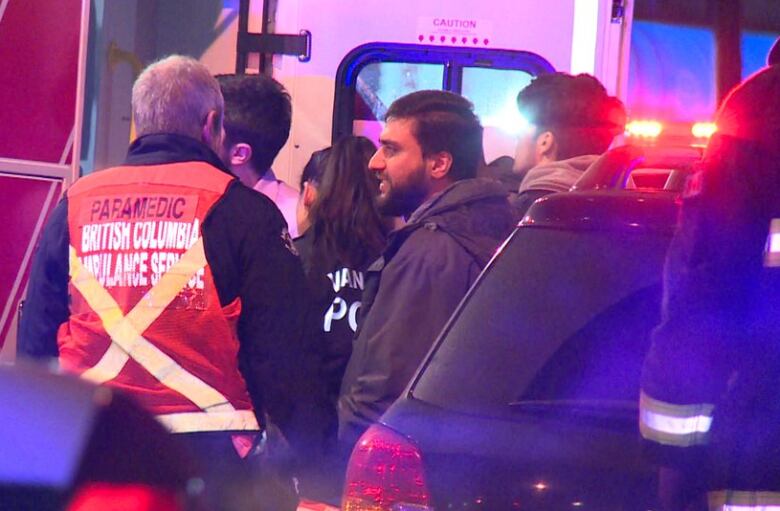
"Everyone was confused, because why? How come Canadian people don't like us?" he said.
In the immediate aftermath,Friesenwasalso unsure of exactly what had happened and why the group had been attacked.
"Definitely when you're working in an information vacuum, you don't know if this is orchestrated, you don't know if there's going to be subsequent events or targeting," he said.
But their confusion and despair quickly turned to relief as an outpouring ofsupport grew.
Both Prime Minister Justin Trudeau and Vancouver Mayor Gregor Robertson took to social media to express their dismay.
I condemn the attack on Syrian refugees in Vancouver. This isn't who we are - and doesn't reflect the warm welcome Canadians have offered.
—@JustinTrudeauLast nights pepper spray incident was a disgusting display of hate - and Vancouver wont stand for it. #VanWelcomesRefugees and always will
—@MayorGregorAl-Radi says that was a big deal.
"There was Justin Trudeau. He says on TV, 'I'm sorry about what happened.' In fact, everybody was happy about that," he said.
He added that the swift response from first respondersand the compassionate treatment from Vancouverpolice a stark contrast to Syrian police left him and the other refugees feeling reassured.
Finding a home
Al-Radi and several other Syrian families found housing at an apartment complex on Cottonwood Avenue in Coquitlam.
But a few monthsafter they settled in, a new challenge a fire seriously damaged multiple suites and displaced the whole group.
Al-Radilived in the adjacent building. His brother, who had also made the voyage from Jordan, lived in the burning one.
"There was smoke, fire," he said, adding that everyone was relieved when the residentsgot out of the building safely, although many lost everything all the things they'd just bought or been given.
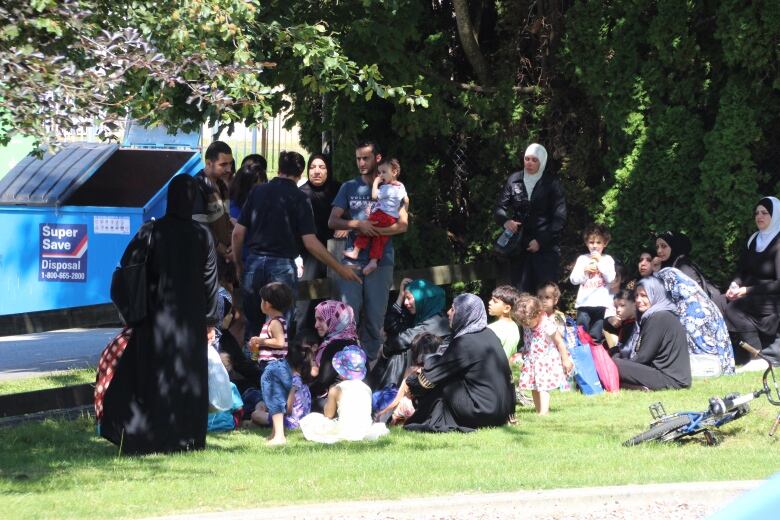
"It was difficult.... After six months, seven months everyone bought everything he needed. In moment, everything finished," said al-Radi.
Friesen and the ISS sprung back into action, finding temporary housing for the affected families and then getting them settled again with new furniture and belongings.
Finding independence
Al-Radifound a new home in Coquitlam, and as his English improved, he found a job manufacturingkitchen cabinets.
He says with pride that he'll be ready to shift off government assistance as his first year in Canada comes to a close.
That puts him in the minority, says Friesen.
"For the bulk, the majority of the refugees, as they've come in under humanitarianimmigration, they'll need some additional years of support until they can fully stand on their own two feet," he said.
As of late November, nearly 2,000 government-assisted Syrians hadsettled in British Columbia, in addition to 424 privately-sponsored refugees and 326 more throughblended VISA office referrals.
More than 35,000 Syrian refugees have arrived in Canada.
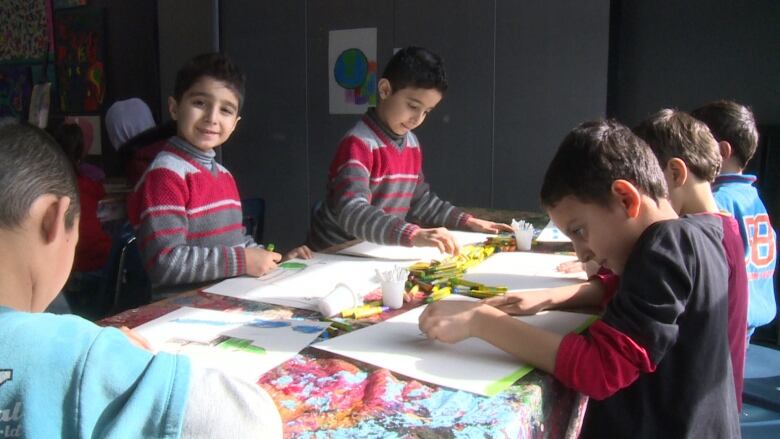
Al-Radi said he initially didn't plan to live permanently in Canada, but he's warming to the idea. His biggest challenge is now finding a career path in his new country, more than three years after putting his academic pursuits on hold.
"I don't want to lose more time," he said. "I have to be looking [out] for my daughter, for my wife, for my future. For me, that's a big challenge for me to select what I have to do," he said.
And any day now, al-Radi and Ayyashwill have another life to look out for: they are expecting a second child another girl.
Follow Rafferty Baker on Twitter: @raffertybaker












_(720p).jpg)


 OFFICIAL HD MUSIC VIDEO.jpg)
.jpg)



























































































